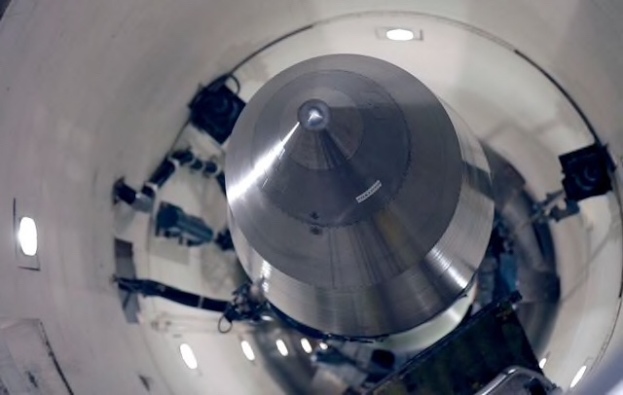An inert Minuteman III intercontinental ballistic missile is seen in a training launch tube at Minot Air Force Base, N.D., in 2014. (Charlie Riedel/AP)
Joseph Cirincione is a nuclear weapons policy expert and president of the Ploughshares Fund, a global security foundation.
As impeachment hearings intensified, an increasingly erratic president appeared to finally snap. “I can go into my office and pick up the telephone,” he told visiting lawmakers, “and in 25 minutes, 70 million people will be dead.”
It was 1974, and the president was Richard Nixon. He was right. U.S. policy, then and now, gives the president absolute authority to launch nuclear weapons whenever they want, for whatever reason. No consensus is required. No one else need approve.
Indeed, no other official even need know. The president, on their own, can simply summon the “nuclear football,” open binders of attack options and relay orders to the National Military Command Center. The orders would be sent down to missile control officers — where intercontinental ballistic missiles are primed on “hair-trigger” alert — and 30 minutes later you’d have nuclear explosions over the targets, just as Nixon claimed.
Nixon had already shown the perils of this system. Late in 1973, he ordered U.S. nuclear forces worldwide to Defcon 3, the highest alert status since the Cuban Missile Crisis. He justified this move by claiming the Soviets were planning an intervention in the closing days of the Yom Kippur War between Israel and a coalition of Arab states.
There was no intervention. But the missiles might still have flown; it all depended on the whims of one increasingly unpredictable man with his finger hovering over the nuclear button.
Nixon alerted us to the danger: Our nuclear command and control system is insane. Now, the age of Trump — perhaps our most volatile president yet — reminds us that we have yet to address the problem.
Nixon’s erratic orders were part of a worrying pattern. As the Watergate investigation continued into 1974, the extent of Nixon’s drinking and paranoia become clear. Fearing the worst, Defense Secretary James Schlesinger told the White House military staff that if Nixon gave them any orders, they were to check first with him or Secretary of State Henry Kissinger.
This was an unambiguously illegal circumvention of the president’s authority. But everyone should be grateful Schlesinger acted.
Who would be Schlesinger now? Who would stop the current president from, as Nixon threatened, picking up his phone and launching a nuclear holocaust? Defense Secretary Mark T. Esper, who has been at his post for less than five months? National security adviser Robert O’Brien, appointed just two months ago? Acting director of national intelligence Joseph Maguire, who only assumed his position in mid-August?
Most likely, none of them. Trump has gutted the national security process and its leadership. Schlesinger and Kissinger — disagree as you might with their politics — were formidable professionals. There are no such guards left standing in this administration.
It is possible that someone in the chain of command might mutiny rather than carry out a launch order. If they did, Trump, like Nixon during his “Saturday Night Massacre,” could fire people until he found someone willing to carry out his order. If Trump’s command came in a time of crisis — perhaps when tensions with Iran or North Korea boiled over into military conflict — there would likely be no hesitation.
Procedures adopted in the fearful days of the Cold War — including the first use of nuclear weapons in a conventional conflict, the sole authority of the president to fire these weapons and keeping our missiles ready to launch in minutes — combine now to present an unacceptable risk of nuclear disaster.
Little can be done now to reduce these risks. If we do escape catastrophe, it should be the first order of business in a new administration to declare new nuclear guidance and adjust nuclear alert postures accordingly.
Legislators, including House Armed Services Committee Chairman Adam Smith (D-Wash.), have already introduced bills to prevent presidents from acting solely on their own to launch nuclear weapons and to make it official policy that America will never initiate a nuclear war. These provide a sound basis for a new president to revamp nuclear doctrine and to prevent, as President John F. Kennedy said, that slender thread holding the nuclear sword of Damocles from being cut by “accident or miscalculation or madness.” We must prepare to do all we can to ensure that no one individual — sane or insane — can ever start a nuclear war on their own.
This column was produced in collaboration with The WorldPost, a publication of the Berggruen Institute.
No comments:
Post a Comment